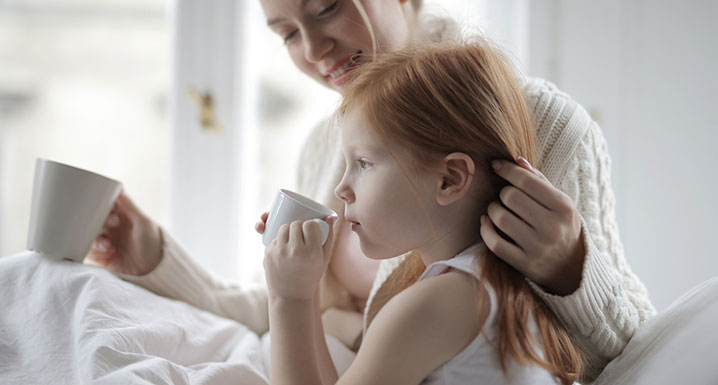
They have questions and you want to be best equipped to answer them. We spoke to Elaine, Child Life Specialist about some of the best ways to talk to kids about COVID-19. She shares some helpful ways to have these conversations and also provides some child-friendly answers to some big questions children may have.
1. Open up the conversation
It’s inevitable that kids have heard about Novel Coronavirus (COVID-19) and it’s important for us to talk to them about it in an honest, factual, and supportive way. Kids may worry more when we avoid talking and their imaginations are often worse than reality.
2. Find out what they already know
This gives us insight into their level of understanding and helps identify possible misconceptions. You might say, “So, what have you heard about COVID-19?”
3. Follow your child’s lead
Find out what they want to know and provide them with honest, simple information using language that is appropriate for their age. Younger children need fewer words. If they don’t ask, there is no need to offer additional information that might scare them. Kids are egocentric and want to know how it will affect them. Many are reassured to learn that most cases in children are mild. Follow their cues for how much information they want at this time.
4. It’s okay not to know all the answers
You can support your child’s emotional needs by listening, speaking calmly, and providing reassurance. If you don’t know the answer to their question, it’s ok to look it up using a reliable online source (such as the World Health Organization). Or, you can also explain that it’s a new virus so there is lots other people don’t know about it too. You might say, “that’s a good question, I’m wondering that too. Scientists are working hard to find the answers and we are learning more every day.”
5. Empower kids by sharing what they can do to stay safe and healthy
We can empower kids by giving them a job (germ busters!) and reminding them to use skills they already know to protect themselves and their loved ones. These include washing our hands for at least 20 seconds (try singing a fun song to pass the time), not touching our face, coughing or sneezing into our elbow or a tissue, practicing physical distancing, and staying home as much as possible. Remember to demonstrate these behaviours yourself too!
6. Remind them of everyone who is helping to keep us safe
Our health care providers, emergency medical services, scientists, and many others are all working hard to protect us. Remind children that they will be taken care of and what you are doing to keep your family safe. Let them know they can talk to you about how they’re feeling or ask questions anytime.
Examples of child-friendly answers to common questions about COVID-19:
What is coronavirus? COVID-19?
Coronavirus is a type of virus. A virus is a tiny germ that can get inside the body and make people sick. The new coronavirus that everyone is talking about causes a disease (sickness) called COVID-19. This disease is new and has never existed before so we are still learning more about it.
How do people get COVID-19?
COVID-19 is spread through teeny tiny droplets of spit or snot. These droplets leave the body when people cough or sneeze. That’s why you should stay at least six feet away from people so their droplets can’t reach you. The droplets can also land on objects and live there for a little while, even though you can’t see them. If you touch something that has the virus on it and then touch your eyes, nose, or mouth, the virus can get into your body. That’s why it’s important to wash your hands often and not touch your face (eyes, nose, mouth) so the virus can’t get into your body.
What happens when you get COVID-19?
Most people who get COVID-19 don’t get very sick. Some people don’t even know they have the virus. Some people may have a fever and a cough. Most people get better on their own by staying home and resting. A small amount of people get very, very sick. People who are older or already have health problems are more likely to get sicker with coronavirus. If someone feels sick, they can call their doctor and get help or advice.
What can I do to stay healthy?
Wash your hands with soap and water for at least 20 seconds, don’t touch your face (don’t pick your nose, rub your eyes, or put your hands in your mouth), if you have to cough or sneeze do it into your elbow or a tissue, and stay home as much as possible. If you go outside like to go for a walk, make sure you stay at least six feet away from people who don’t live in your home. Six feet is about the same length as your bed.
Why do we have to stay home?
If we all stay home, less people will get the virus. The doctors and nurses and health care workers can help everyone get healthy again. We don’t know how long this will last but it won’t last forever.<

